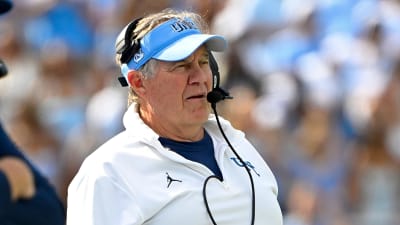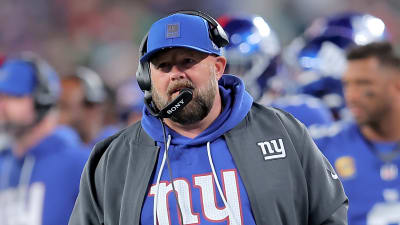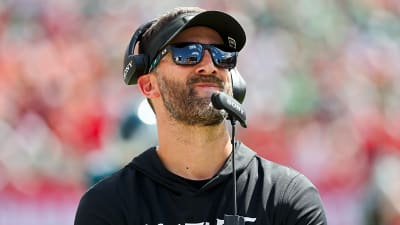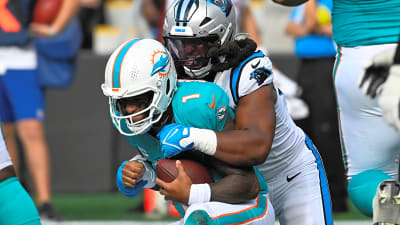
For the fourth game in a row, the Baltimore Ravens suffered a double-digit loss to a reigning division champion, falling 17-3 to the Los Angeles Rams in Week 6 of the 2025 season. However, it was still the closest margin of defeat since their losing streak began. Unlike their previous three shortcomings, they actually showed some fight and played much better in the trenches on both sides of the ball, but still fell to 1-5, which is the worst start in the franchise's 30-year history. Here are some of the top takeaways from another debilitating defeat.
Ravens Fail to Capitalize on Sloppy Day From Rams
In a game they desperately needed to win in order to snap their losing skid and head into the bye week on a high note with some momentum, the Ravens got all the breaks they needed to pull this game out, but couldn't get out of their own way and get it done. The Rams looked completely jetlagged from the start of the game, with Matthew Stafford missing open targets and his usually reliable receivers dropping accurate passes. Their special teams unit cost them three points on a missed chip-shot field goal and negated what would've been their second turnover of the game on an illegal man downfield penalty on their first punt of the game.
Whether it was untimely sacks and penalties stalling out the offense, putting the ball on the ground four times and losing fumbles on back-to-back drives or only managing points three on three red zone drives, they came up short far too many times to make the most of a golden opportunity to earn a hard-fought game without star quarterback Lamar Jackson.
"We created our opportunities, and we put ourselves in a position where we could have won that football game," head coach John Harbaugh said. "Probably, you could say, in some ways, we should have won it, but we didn't do the things that you have to do to win the game. We made some critical mistakes that cost us an opportunity to win the game, and that's really what it boils down to."
Situational Offensive Play-Calling and Execution Remains an Issue
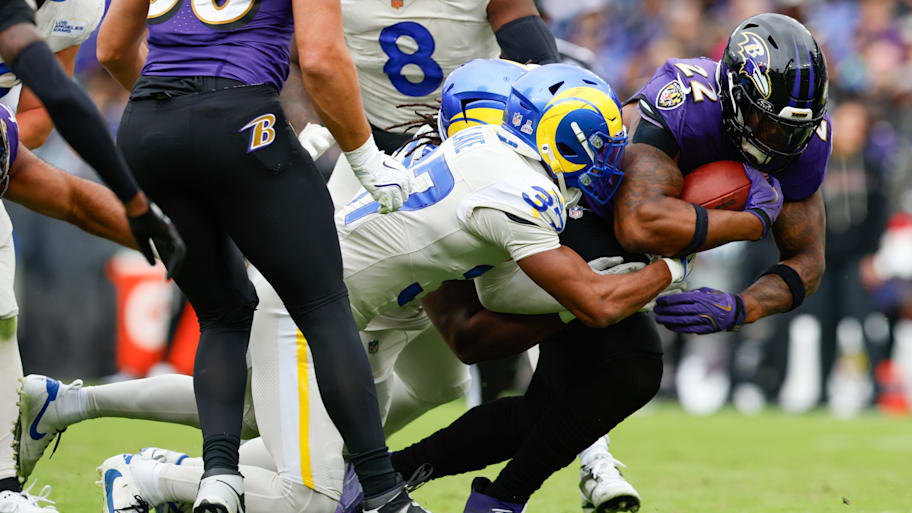
The Ravens squandered the best outing from their rushing attack and five-time Pro Bowl running back Derrick Henry since the season-opener in this game, largely due to head-scratching decisions when it came to play and personnel decisions and poor execution on the part of the offensive line. Offensive coordinator Todd Monken stayed committed to the run game through the first three quarters, but didn't keep Henry on the field when it mattered most, nor give him the ball enough in crucial situations when he was in the game.
Henry averaged 5.1 yards per carry in this game and was relentlessly gashing the Rams' defense early on, yet in their first major fourth-down decision with just three yards needed for the first down, he wasn't on the field, which telegraphed to the defense that the threat of the run was slim to none. Instead, Monken put the ball in backup quarterback Cooper Rush's hands, and he proceeded to throw an inaccurate incompletion deep down the field.
Needing less than five yards to extend the drive, giving the ball to Henry, who was their best player left standing or even faking a handoff to him and running play-action would've made or sense. Even if they still wanted to throw it, having more immediate-to-shallow level routes would've been better, something that creates a natural pick and gets the ball out quickly in the hands of a playmaker who can pick up the necessary yardage like the Kansas City Chiefs do a dozen times a game with less-talented weapons.
Both Monken and the offensive line were at fault for the most atrocious and ultimately pivotal failed sequence of the game for the unit that took place at the end of the first half and resulted in the game being tied at halftime instead of being up 10-3.
After Henry had pounded his way down to the Los Angeles 1-yard line with 1:47 left in the second quarter, Monken didn't keep feeding the beast and dialed up back-to-back tush-push quarterback sneaks with tight end Mark Andrews lined up under center. After both attempts were unsuccessful because the offensive line failed to generate any push, Henry got the ball on fourth down and was almost immediately met in the backfield by a trio of defenders for a loss of 2 yards, resulting in a turnover on downs.
"We just didn't get a yard," Pro Bowl center Tyler Linderbaum said. "They wanted it more than us. When it comes down to it, who wants it more?"
Defense Heading in Right Direction
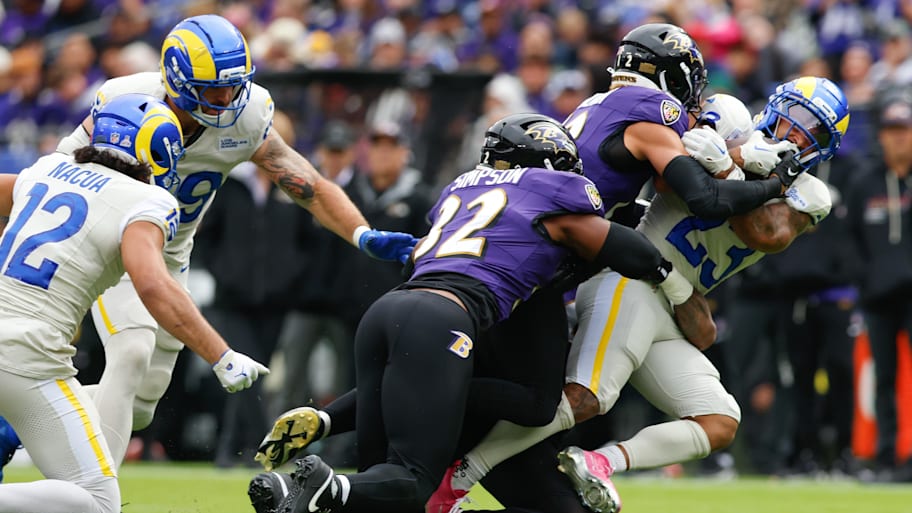
For the first time in nearly a month and only the second time this season, the Ravens looked like themselves and played up to their standard on the defensive side of the ball. Second-year defensive coordinator Zach Orr's unit had its best performance of the season, even more than the 41-17 Week 2 win over the Cleveland Browns, because it came against one of the best and most balanced offenses in the league.
The Ravens came into this game with the league's leading passer in Stafford, who has been playing at an MVP level, and the leader in targets, receptions and receiving yards in Puka Nacua, who has been on a historically torrid pace to start the season. Both were held to season-lows as Stafford threw for just 181 passing yards and one touchdown while being sacked multiple times for just the third time this year and Nacua finished with 2 catches on 3 targets for 28 receiving yards, although he did suffer what was later revealed to be an ankle sprain in the first half.
Six-time Pro Bowl veteran wideout Davante Adams was also held to a season-low in receiving yards with just 39 and Baltimore didn't allow 100-plus rushing yards for the first time this season as Los Angeles' usually potent offense only mustered 241 total yards, including just 74 on the ground. Both are season lows for what has been a much-maligned Ravens defense who forced it's first turnover since Week 2 and just the third all season, forced multiple punts in a game for the first time in three weeks with first coming in the first half instead of fourth quarter with the backup quarterback for the opposing team checked in and they recorded pair of sacks for just the second time this season as well.
The new addition of veteran safety Alohi Gilman paid immediate dividends as it allowed his former college teammate, All Pro safety Kyle Hamilton, to play closer to the fray near the line of scrimmage in the hybrid slot role that made him a star. Both players helped shore up the run defense and fixed a lot of the tackling issues the Ravens were having at the second and third levels, in addition to limiting big plays through the air. Gilman played 83% percent of the Ravens' total defensive snaps with 44 and finished with the second-most total tackles with 7, including 4 solos.
"I felt like we picked it up defensively," rookie linebacker Teddye Buchanan said. "The Rams have a good offense. We were able to make some situational plays [on] third and fourth down [and] red zone stops, which we haven't been doing the last however many weeks. Yes, [there are] definitely some positives to take away, but I think about that drive to open the half, and that's where we can be a lot better and keep the momentum we had [and] not let it go to them to start the half."
Tyler Huntley Should've Been QB2 All Along
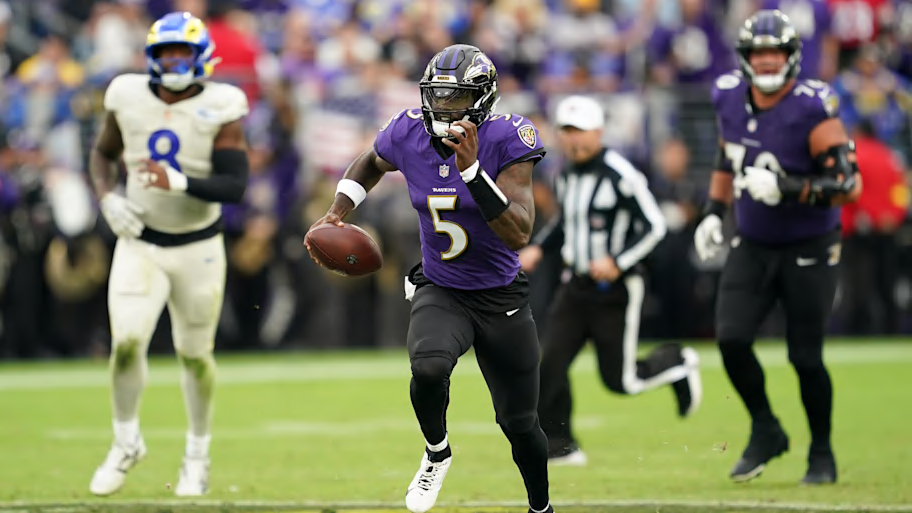
The Ravens made the most significant investment in the backup quarterback position than they have in half a decade since Robert Griffin III this offseason when they signed Cooper Rush to a two-year deal worth $6.2 million. At the time, it somewhat made sense on the surface as the ninth-year veteran has established himself as one of the best reserve signal callers in the league during his tenure with the Dallas Cowboys, where he spent seven of his first eight seasons and complied a record as an interim starter of 9-5.
Rush was an ideal backup for three-time Pro Bowler Dak Prescott, who has become more adverse to scrambling the deeper he's gotten in his career and has almost always had strong offensive lines blocking for him. However, his fit in Baltimore never seemed like it felt right just from a stylistic standpoint. Teams usually have their backup quarterbacks be as close to a mirror image of their starter as possible. When it comes to Jackson and Rush, they couldn't be any more different.
Before this game, the Ravens' offensive line had struggled to get much consistent traction in the run game and their pass protection has been inconsistent and prone to crumbling in the biggest moments all season.
The Ravens finally decided to turn the reins of the offense over to Huntley, who had served as Jackson's primary backup from 2021-2023, and he not only immediately provided the unit with a spark, but his difference in dynamism when the pocket began to crumble was stark. Rush is the kind of immobile quarterback who needs positive game scripts to be successful and struggles to overcome negative plays and long down-and-distance situations. While Huntley may not be as high-level of a processor in terms of reading defenses quickly and being decisive throwing, he can still make them pay out of structure and pick up key first downs with his legs on designed runs and scrambles.
If the Ravens could find a way to possibly flip Rush for an immediate asset such as an offensive guard, defensive tackle or edge rusher, to fortify their shallow depth at one of those positions before the trade deadline, they could just sign Huntley from the practice squad to the 53-man roster.
More must-reads:
- Mishandling of young QBs doomed Titans HC Brian Callahan
- Steelers' Mike Tomlin has strong feelings about Browns trading Joe Flacco to Bengals
- The 'NFL 250-passing-yard game leaders' quiz
Breaking News
Trending News
Customize Your Newsletter
 +
+
Get the latest news and rumors, customized to your favorite sports and teams. Emailed daily. Always free!

